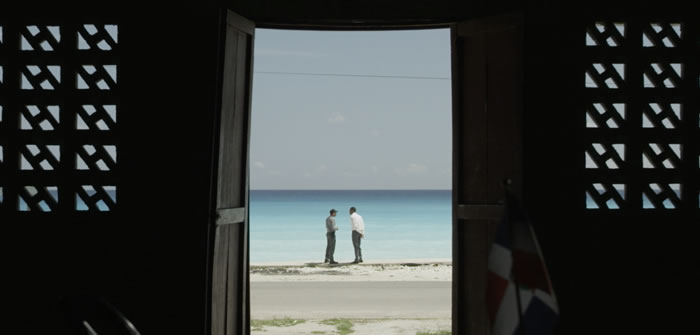Like the recent Brazilian film Araby, Dominican writer-director Nelson Carlo de los Santos Arias’s Cocote grafts a fictional narrative onto the sturdy stock of documentary filmmaking. Here, the story concerns Alberto (Vicente Santos), a gardener for a wealthy upper-class family in Santo Domingo who’s forced to return to his remote rural hometown of Oviedo when he receives word of his father’s recent murder by decapitation in retaliation for unpaid debts. (The film’s title refers to the nape of the neck, thus to the wounds inflicted on Alberto’s father.) Tensions quickly arise within Alberto’s family due to the moral and theological conflicts between Alberto’s brand of Pentecostal Christianity and the syncretistic folk religion known as “Los Misterios” that his family practices.
Alberto initially assumes that the proper authorities will apprehend the assassin, whose identity, after all, is well known throughout the town. It’s precisely the sort of systemic naivete from which he’s quickly disabused. The killer turns out to be a member of the National Police and, as such, effectively enjoys carte blanche. Alberto’s family, on the other hand, wants him to take the law into his own hands and avenge his father’s death, to meet violence with violence, an idea that’s anathema to his spiritual self-image. Against Alberto’s attempts to play the quiet and dignified peacemaker, the film contrasts the profusely profane tirades of his sister Karina (Judith Rodriguez).
De los Santos Arias lets the details emerge slowly and naturally from the course of events. Cocote is structured around a series of religious observances—both organized Protestant as well as more freewheeling folk rites—undertaken by Alberto’s family and other members of the community. The filmmaker captures everything in a hyper-stylized blend of film stocks and aspect ratios, switching seemingly at random between color and monochrome, widescreen and Academy ratio.
These formalist tactics foreground Alberto’s divided allegiances without devolving into anything too broadly schematic or easy to parse. The filmmaker clearly doesn’t want to come down on either side of the doctrinal debate. De los Santos Arias further complicates the narrative viewpoint by incorporating segments of stock news footage that are apparently meant to demonstrate the credulity on both sides of the theological rift, including a televised mock exorcism and a story about a rooster that allegedly crows “Christ is coming!”
Some of de los Santos Arias’ other stylistic flourishes obviously derive from a studied familiarity with the films of the French New Wave (in particular those numerous 360-degree pans, which seem to have been lifted straight from the Godard playbook) as well as the Third Cinema of the Brazilian filmmaker Glauber Rocha. The latter sought to give voice to socially and politically marginalized Third World populations, at least in part, by rejecting mainstream (classical Hollywood) narrative storytelling conventions. De los Santos Arias has clear affiliations with this tradition.
Cocote’s narrative structure exhibits a tidy symmetry, strongly suggesting that what ultimately transpires has a certain inevitability to it, that cycles of retribution and vendetta all too easily devolve into vicious circles. The same starry night sky, after all, gazes down impassively on the violence that erupts in Oviedo and the swanky soirée taking place back in Santo Domingo. The film’s final shots show how easy it is for Alberto to resume his wonted place in Dominican society. What has become of the inner man, fittingly enough, is left an open question for viewers to resolve for themselves.

